 |
||
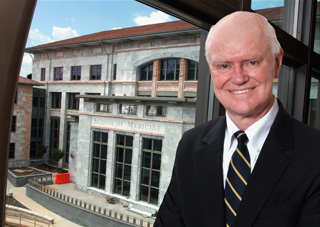 Good news—we have revamped The Dean's Letter to share with faculty, staff, and students via email and the web. It's a great way for us to stay in touch about issues, events, and honors. You also can view The Dean’s Letter online. To submit news items for future issues, please contact Kay Torrance in Health Sciences Publications at 727-6799 or kay.torrance@emory.edu. |
||
Making the new building name official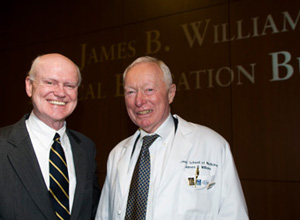 At the recent dedication ceremony, I presented James B. Williams with his own white coat. At the recent dedication ceremony, I presented James B. Williams with his own white coat.
Soon you'll see his name over the door. I'm so pleased that we have named our School of Medicine building for Trustee Emeritus James B. Williams, retired chairman and CEO of SunTrust Banks. Recently, he and I have been working with the university architect to find the best location on the outside of the building for a name plaque. Williams recently was honored at a dedication ceremony by the school and university. He was presented with a piece of pink marble (used on the exterior of the building) and a white coat, both of which were inscribed with his name. "Robert Woodruff’s favorite saying was that there was no limit to what a man could accomplish if he did not worry about who received the credit," says Emory President James Wagner. "Jimmy Williams, one of the most modest men I know, followed that to the letter, but we are grateful that he, like Mr. Woodruff, eventually agreed to let us use his name to honor all that he did for us." Williams has served Emory for 35 years, including on the Emory University Board of Trustees and as chair of the WHSC Board for more than 20 years. Naming this important facility the James B. Williams Medical Education Building is an honor for the medical school and a tribute to a man whose leadership contributed to the medical school’s dramatic rise to one of the nation’s top research-oriented medical schools.
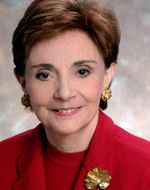 Sharon Weiss 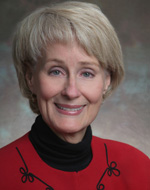 Claudia Adkison SOM faculty now have more opportunities than ever to enhance their leadership and professional skills and develop new methods of teaching. "Faculty are our most precious resource," says Sharon Weiss, Associate Dean for Faculty Development. "We take great care and expend great energy in identifying and recruiting talented faculty, and they deserve every opportunity to succeed. Not only does their success reflect favorably on our institution, but retention of faculty is an important and economically sound means of planning for the future." While there are many opportunities at the department level—chairs are encouraged to create programs tailored to their specific needs—Weiss has developed several initiatives to assist all faculty in achieving their career aspirations. The monthly Faculty Development Series provides lectures throughout the year on practical topics for success, such as "Funding Opportunities," "Ten Tips to Getting a Manuscript Accepted," and "The Promotion Process." The faculty development office also offers a five-month, 30-hour Junior Faculty Development Course (with CME credits) for full-time instructors and assistant professors. The course provides didactic presentations, panel discussions, group and individual exercises, and case-based problem solving. Led by SOM and Goizueta Business School faculty, the course provides information on teaching techniques, organizational and financial structure of an academic medical center, grant writing, conducting effective presentations, negotiation and conflict resolution, conflict of interest, and legal problems in the workplace. The course is given annually beginning in January. Weiss and her faculty development advisory committee also have devised the faculty development conference report, which allows faculty to track their accomplishments in anticipation of their periodic evaluation by their departments. This form, including an evaluative summation by the chair, is automatically archived at year's end and serves as a chronicle of a faculty member's academic progress. 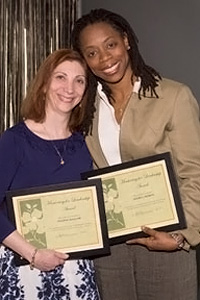 Nadine Kaslow and Sheryl Heron Nadine Kaslow and Sheryl Heron
In addition to taking advantage of the faculty development offerings, I urge each of you to become involved in mentoring. I can't say it often enough: Mentoring is beneficial to both parties. Let me share one example of a productive mentorship. More than 10 years ago, Arthur Kellermann, then Chair of Emergency Medicine, introduced Sheryl Heron to Nadine Kaslow (Psychiatry). Heron was a new faculty member of EM, and both she and Kaslow shared an interest in intimate partner violence. They first worked together on the Georgia Commission on Family Violence medical protocol committee, and then Heron joined Kaslow as co-PI on several of her grants. They both joined Emory's Passages Program, a structured, formalized mentoring program with planned meetings that focus on both participants' career goals. "I appreciate that these meetings not only focus on helping me stay on track and assisting me in finding a good work-life integration, but that we also attend to Nadine's future career path, which broadens my horizons," Heron says. Kaslow and Heron were recognized in mid-April by the President's Commission on the Status of Women with a Mentoring for Leadership award. Both say their mentorship and friendship have helped them flourish in academic medicine.
Congratulations to WinshipCongratulations to our colleagues at the Emory Winship Cancer Institute. They received word on April 13 that Winship will join an elite group of 64 centers nationwide that are on the forefront of the battle against cancer as a National Cancer Institute Cancer Center. The faculty and staff at Winship, especially Brian Leyland-Jones, Fadlo Khuri, Paul Doetsch, Rein Saral, and Walter Curran, along with the support of the Woodruff Health Sciences Center administration, the Georgia Cancer Coalition, and the American Cancer Society, have worked many years to make this happen. This designation opens the door to new clinical trials and technologies available only to NCI Cancer Centers.
Council of DeansIn early April, I returned from a meeting of the Council of Deans of the Association of American Medical Colleges. Along with my colleagues from other medical schools across the country, we looked at a number of "hot topics" that we would like the AAMC to address further. At the top of the list was research. We talked via teleconference with the interim director of the NIH, Raynard Kington, who outlined the impact of the proposed stimulus package from the Obama administration. While all of us have felt the ramifications of a flat NIH budget, I came away from Kingston's talk feeling that there will be substantial opportunity for Emory researchers for increased research funding in the package. We also looked at the future medical workforce. Are medical schools training the right number of students and equipping them with the proper skill set for the future? There was a strong feeling among the deans that medical faculty need to embrace a new way of preparing the next generation of doctors, including placing more emphasis on preventive medicine and predictive health. I envision that that conversation will develop further in the future. In the short term though, we have increased our enrollment, along with many other medical schools, by 15%, as requested by the AAMC, and seven new medical schools are being planned.
Moving forward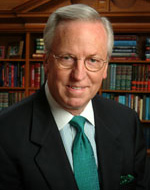 William Wood William WoodPlease join us for the School of Medicine's Diploma Ceremony on May 11, as we say goodbye to this year's M4 class. William Wood, professor of surgery and former department chair, will be the speaker. Of our 109 Emory graduating seniors, 105 participated in Match Day this past March. Some of the most popular specialties chosen by Emory's graduating seniors include Internal Medicine, Pediatrics, Obstetrics and Gynecology, Anesthesiology, General Surgery, Diagnostic Radiology, Psychiatry, and Orthopaedic Surgery. Their training will be at such prestigious institutions as Emory, Brigham & Women's, Harvard, Johns Hopkins, UCSF, UCLA, Duke, Washington University, and Georgetown. Forty-five of the graduating students will remain in Georgia, and 43 will remain in Emory's Affiliated Residency Training Programs. Larsen to present Dean's Distinguished Faculty Lecture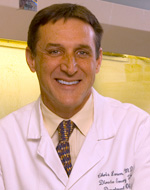 Christian Larsen Christian Larsen Christian Larsen will present the 2009 Dean's Distinguished Faculty Lecture on May 28 at 5:30 pm in the School of Medicine's lecture hall. The award's committee chair, Kenneth Brigham, Associate Vice President and Director of the Emory/Georgia Tech Predictive Health Institute, cited Larsen's accomplishments in developing improved immunosuppression drugs that protect transplanted organs with less toxicity. Larsen has performed more than 500 adult and pediatric kidney and kidney/pancreas transplants and has established Emory as one of only a handful of centers worldwide to offer islet cell transplantation. He recently succeeded William Wood as chair of the Department of Surgery. Listen to Larsen's podcast on pancreatic islet cell transplantation and new immune tolerance drugs at Emory Sound Science.
Delivering care for a new generation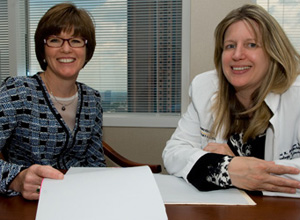 Sarah Berga
and Donna Session Sarah Berga
and Donna Session
The Department of Gynecology and Obstetrics has collaborative research interwoven across several disciplines. "We are the only SOM department anchored primarily at Grady and Emory University Hospital Midtown, not on Emory's Clifton campus," says Sarah Berga, James Robert McCord Professor and Chair. "Our goal is to use the promise of molecular medicine for women and their reproductive health." Integral to this goal is the department's long collaboration with the Emory Winship Cancer Institute. Together, they recruited Sharmila Makhija to serve as director of the Division of Gynecologic Oncology. "She expands our portfolio of cutting-edge therapies for women with cancer," Berga says. Makhija is a Georgia Cancer Coalition Distinguished Cancer Clinician and Scholar and currently serves on the NIH Clinical Oncology Study Section. Her research interests include chemo-resistance in ovarian cancer, and she is an internationally known expert in cancer prevention. Infertility, which affects 10% of U.S. couples, is another interdisciplinary research area in the department. The division of reproductive endocrinology and infertility is partnering with EUH Midtown urologists to study male infertility, which is a contributing factor in about half of infertile couples. In addition, psychobiologist Mark Wilson is conducting neurophysiology and neuroimaging studies at Yerkes to better understand the mechanisms by which stress compromises fertility. Highlighting the division's national prominence is the Emory Reproductive Center under the direction of Donna Session. The center has a higher-than-average pregnancy rate in women over 35 (57% of cycles, compared with the national average of only 45%). The center also received accreditation from the College of American Pathologists for its high standards and excellence in laboratory quality assurance (it received zero deficiencies). The department has developed a new model in graduate medical education to provide enhanced care for mothers in labor. A team of residents and medical students now work together with nurses and attending ob/gyns to ensure safety, quality, and personalized care. "Our new model, called the ob resident rapid response team, broadens the educational experience for students and emphasizes teamwork," reports Berga. "The team approach is an increasingly important paradigm for ensuring the highest patient safety and satisfaction." • Kevin Ault is principal investigator of a new study to evaluate an investigational test used to detect high-risk types of human papillomavirus associated with cervical cancer. • Melissa Kottke, director of the Jane Fonda Center, which focuses on adolescent reproductive health, has received a grant of up to $1 million over four years from the Robert Wood Johnson Foundation to help reduce intimate partner violence through prevention, as well as a $500,000 grant from the Ford Foundation to support sex education programs using youth advocates. • The Human Uterine Biology (HUB) Center, headed by Robert Taylor, received several new grants, including two RO1 grants to Neil Sidell. Faculty in the HUB study endometrial cells and the role they play in endometriosis, preeclampsia, preterm labor, and oncogenesis.
Recent awards and honors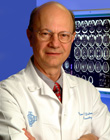 Mahlon DeLong Mahlon DeLong
Mahlon DeLong, Professor of Neurology, has been elected a fellow of the American Academy of Arts & Sciences. The Academy, one of the nation’s most prestigious honorary societies and a center for independent policy research, is made up of leaders in the sciences, the humanities and the arts, business, public affairs, and the nonprofit sector. Among numerous awards, DeLong recently received the 2008 Movement Disorders Society Lifetime Achievement Award and the 2009 American Academy of Neurology Movement Disorders Research Award. Paul Root Wolpe, Professor of Medicine and Director of Emory's Center for Ethics, has been appointed to the Raymond Schinazi Professorship in Jewish Bioethics. The naming in the Department of Pediatrics honors Raymond Schinazi, Professor of Pediatrics and holder of the Frances Winship Walters Chair in Pediatrics. Schinazi agreed to the creation of this chair from funds held in an Emory account for furtherance of his own research and professional development. Nanette Wenger was awarded the Master of the American College of Cardiology. The designation is given each year to no more than four people who have been a dedicated fellow of the College for more than 15 years. J. Muse David 09G 10M was one of 13 students to receive the 2009 Harold M. Weintraub Graduate Student Award sponsored by the Basic Sciences Division of Fred Hutchinson Cancer Research Center. Winners were selected on the basis of the quality, originality, and significance of their work. David's research centers on the formation and function of the tuberculous granuloma. The recipients will participate in a scientific symposium May 1 at the Hutchinson Center. Jeff Salomone received the Emerald of the Year award from MAPES, the Metro-Atlanta Police Emerald Society, an organization of law enforcement officers from north Georgia. The award recognizes outstanding service to law enforcement and the community. Barbara Stoll received one of the 2009 Unsung Heroine Awards given by the Center for Women for her dedication to issues affecting women. Congratulations to the students, house staff, and faculty who were elected this year into Emory's Alpha Omega Alpha (AOA) Honor Society. Each year the AOA honors students at the top of their class who are leaders among their peers, have a high degree of ethics and professionalism, are committed to patient and community service, and are the future leaders of medicine. They include the following members of the Class of 2010: Laura Agnew, Brandon Fornwalt, Justin Gordon, Meredith Holtz, Nicole Kansier, Erin Kinney, Marae Shewmaker, and Malcolm Squires; house staff Avani Ingley, Karen Law, and Andrew Page; and faculty honorees H. Jean Khoury and Carl Washington. |
||
 |
||
 Stephen Warren
Stephen Warren
 Paul Wolpe
Paul Wolpe Nanette Wenger
Nanette Wenger 